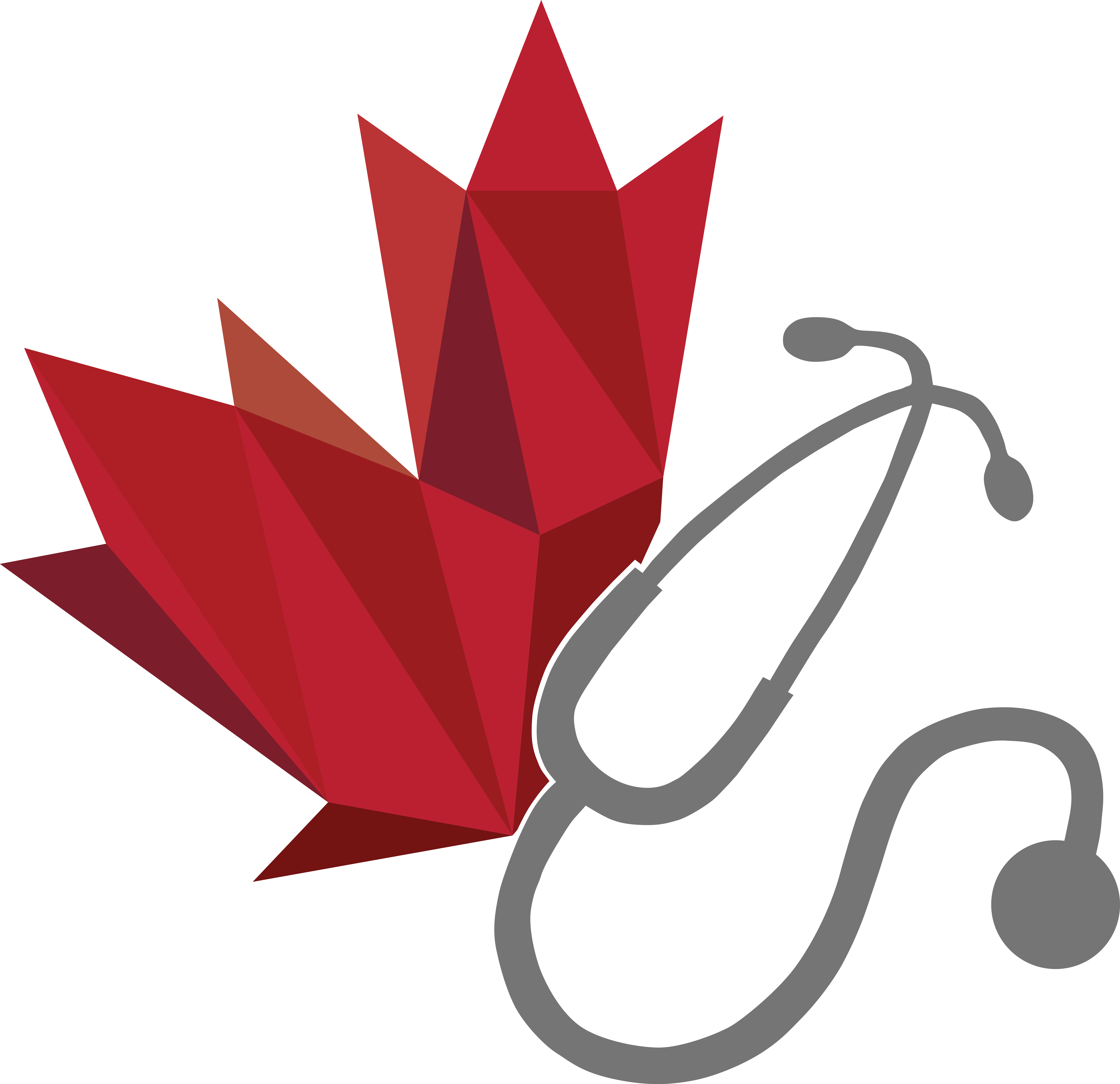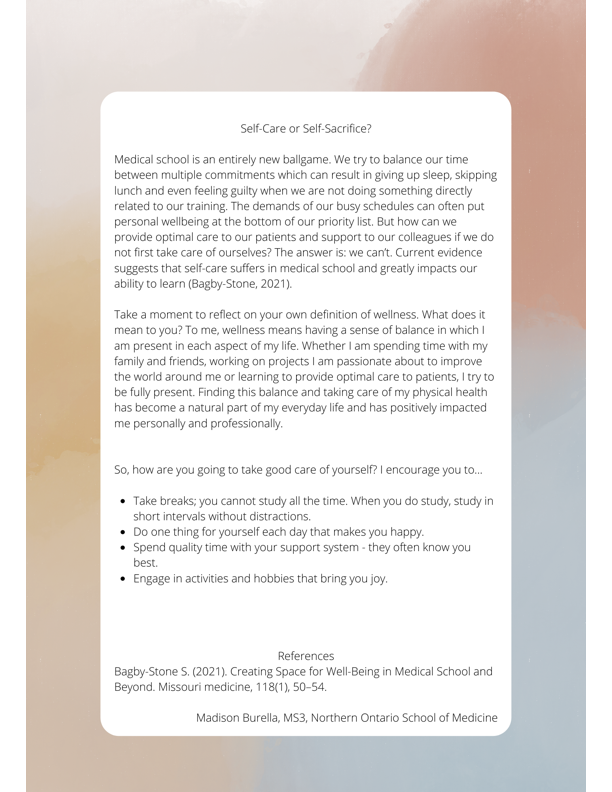Social/Relationship Wellness
Social/ Relationship Wellness 2022
Jump to:
- Minding Your Stress with Mindfulness Apps
- Self-Care or Self-Sacrifice
- Clerkship and First Times
- Finding Balance in Medical School
- Medical Students and Different Stages of Life
- The Importance of Maintaining Relationships Outside of Medicine
- Checking-in On Our Peers
- Setting Boundaries
- Time Efficient Strategies to Maintain Social Relationships
Minding Your Stress with Mindfulness Apps
Have you ever felt your mind racing after a busy shift, feel anxiety creeping into your day or you are just having difficulty falling asleep? Consider engaging in mindfulness practice. There are many smartphone apps which can help you practice mindfulness to reduce the impact stress has on your day-to-day life. We all carry stress differently, whether it be anxious thoughts, headaches or back pain, however, calming our minds may help us feel almost instant relaxation. It can also help you realize when your mind is wandering and help you redirect yourself back to the present moment, leading to better focus and ultimately overall wellbeing. Let’s build healthy habits early on in our medical training to help us prevent burnout in the future.
Mindfulness-based smartphone apps include:
- Headspace
- Calm
- Breethe
- Ten Percent Happier
- Sattva

Image Source https://www.headspace.com/headspace-meditation-app
References:
Economides, M., Martman, J., Bell, M. J., & Sanderson, B. (2018). Improvements in Stress, Affect, and Irritability Following Brief Use of a Mindfulness-based Smartphone App: A Randomized Controlled Trial. Mindfulness, 9(5), 1584–1593. https://doi.org/10.1007/s12671-018-0905-4
Madison Burella, MS3, Northern Ontario School of Medicine
Self-Care or Self-Sacrifice
Clerkship and First Times
By Myriam Harper
Clerkship, beginning in the third year of medical school, is the moment we transition from classes to clinical duties and is a highly anticipated year by many of us. It is the moment we have all been waiting for since our admission to medical school where we finally get to interact with patients and begin to apply our knowledge. Although it is a very exciting year where the learning curve is exponential, it is quite a challenging transition. Switching from classes to working long hours in the hospital, all while having to study for exams can be exhausting. One particularly unique challenge about third year is the constant change, as clerks we are never in one place for very long. Every six weeks we are beginning a new rotation in a new specialty, with new preceptors and nursing staff, in a new environment and sometimes even in a new hospital. As such, we are often the “new person” on the ward unsure of where to go or how things are done in this new specialty. Naturally, the start of every rotation is always stressful, and that is completely normal.
I recently stumbled upon a podcast by Brené Brown where she talks about the challenges of living new experiences, or first times, as she likes to call them. She states that being new at something is incredibly vulnerable and uncomfortable but that this discomfort is necessary to learn and grow. The discomfort of exploration and being an “awkward” rookie is the key to learning and knowing that we have the strength to survive and come out of the experience with new skills. That is what clerkship is all about; getting comfortable with the uncomfortable and learning to become the best clinicians of tomorrow. It is not easy by any means, and new rotations or first times will most likely always be challenging, but there are things we can do to help ourselves. In her podcast Brené Brown shares her strategy on how to embrace the discomfort of new. One important thing to do is naming and identifying the new experience you are in, as it is important to recognize and identify it. By naming your first time you are then able to normalize it, put it into perspective and reality-check your own expectations.
I encourage you to try Brené Brown’s strategy at the start of a new rotation. Normalize the apprehension you may feel, put it into perspective and know that this is not a permanent feeling. Though you may have a hard time adjusting at first and you may not perform at your best, this is completely normal, and it does not make you a bad medical student. You will progress through medical school and become the clinician you once dreamed of becoming!
Reference:
Brown, Brené. (Host). (March 2020). Brené on FFTs [Audio podcast episode]. In Unlocking Us with Brené Brown. Spotify. https://open.spotify.com/episode/6UAoHu3VQJNrZcBubo4ABF
Finding Balance in Medical School
With all that we have to complete in medical school, it can feel like there are not enough hours in the day to study let alone dedicate to other commitments. We can even feel guilty when we step away to take some personal time. But being able to find that balance is vital to help prevent burn out and maintain overall wellness. Proactively taking small steps in our everyday lives can help us succeed in school while also having a “life” outside of it.
Here are a few tips to try out:
-
Make a routine that works for you
Having a routine that fits your lifestyle is key to help with time management and keep all your tasks organized. You may prefer a more flexible schedule or a very structured one, it's all about what best allows you to get your tasks done without stressing out too much. Routines can help you find balance by explicitly setting out times for exercise, sleep and connecting with friends. Creating a routine can also help you visually see how much time you are dedicating to certain aspects of your life and reflect on if you may need to reprioritize.
-
Figure out how you study
Learning how you study best can help you become more efficient with your time and decrease stress. There are countless learning strategies, and whether you do best reviewing anki cards, writing up notes or listening to videos, figuring out your learning style will benefit you greatly. Explore and test out different methods and see if a certain one helps you understand material better. Once you have a good grasp on your learning style you will be able to navigate medical school a lot smoother.
-
Hide your books!
Stepping away from the infinite amount of studying we have to do can be tough. But scheduling in time where you are “book-free” can help reclaim some of your time back for other priorities. Personally, I actively make the decision to no longer do schoolwork after 7pm and on Sundays. This time can be dedicated to hanging out with friends, reading non-school related books or binge-watching a netflix series. Whatever it is, just make sure it’s not school related! Having dedicated time for your hobbies and relationships will benefit you in the long run.
-
Do what you love, other than studying
Similar to the last point, spend time doing the things you love or discovering new hobbies. It can be easy to let medicine take over your entire life, but medical school is also a great time for self-discovery and connecting with those who have similar interests. Our hobbies are often great self-care activities and denying time for them can contribute to burn out. Make an active goal to dedicate some time every week to do the things you love, your future self will thank you.
-
Check in with your people
This journey can feel daunting and lonely. There is no question, medical school is a huge commitment, and we have to sacrifice a lot of time with our loved ones. Relationships can become strained and there is serious FOMO every time you have to miss another get together. It can help to voice these feelings with your family and friends and let them know ahead of time when you will be busier than normal. In medical school, you have to prioritize your relationships and put in a little more effort than you may have had to before. But making sure to check in with loved ones on a regular basis can be very helpful. Talking to our biggest cheerleaders will keep us motivated, grounded and remind us why we started this journey in the first place.
Medical Students and Different Stages of Life
Everyone entering medical school has a different journey of getting here. Some students are parents, some had an entirely different career before choosing medicine, and some entered straight from their undergraduate degree. The truth is people change their careers all the time. Does this make connecting with our classmates difficult and does it lead to the formation of a divide in classrooms?
Medical education and training can contribute to the development of psychological stress. Having a support network within your classroom is critical to avoid burnout. Therefore, it is important to adapt quickly, change your mindset if needed, and recognize the similarities among classmates, despite the differences. I have been privileged to find friends among all age groups in my class. All of them have taught me discipline, a clearer understanding of why medicine, clear future objectives, better understanding of patients’ concerns, and have helped me refine my study techniques. At times, we might not have a “shared experience” with other students in the classroom, but we can create new ones. In medicine, the unique understanding of the lifestyle, stress, and joys of medical school are one of the things that make the friendships rewarding. Reaching out to create a diverse group of friends provides incredible insight into the medical world. The contrast of our insights provides a balanced perspective, and our different observations can point out blind spots that we might be missing. Spending time with students who have lived a different life can be refreshing and encouraging. Therefore, creating a sense of belonging and a feeling of security among our classroom is a goal that we should all have in our minds while we go through this hard yet rewarding journey together.

Image source Google
The Importance of Maintaining Relationships Outside of Medicine
Do you ever feel like your life is beginning to revolve around medicine and you've lost touch with the outside world? While focusing on your studies is important, it is equally important to dedicate some time to build and maintain relationships with people outside of the medical community. Here are just a few reasons why:
- Gain a new perspective on struggles or encounters - if you're struggling with feeling overwhelmed or are having feelings of imposter syndrome, having someone to talk to that can give you a different or objective perspective help you work through your feelings. Often they will point out details that you may have overlooked or took for granted that can provide you with a more positive outlook.
- Opportunity to practice patient rapport building skills - sometimes we get so used to talking to our colleagues that we forget that not everyone understands what we mean by jargon such as tachycardia or hypertension. Having conversations with people outside of medicine is a great opportunity to practice explaining situations you've encountered at a level that is understandable for everyone, which your future patients will appreciate.
- Prevent burnout - taking a break from medicine and focusing on a different aspect of life with others gives your brain the opportunity to rest and disconnect from medicine. Doing this regularly will allow you to come back to studying or clinical work recharged and more excited to immerse yourself in medicine, which can increase productivity and enjoyment.
Checking-in On Our Peers
Medical school is an experience that bonds people together in a unique way. We understand each other’s struggles and can empathize when things get overwhelming. While it's important to build our own social security net so that we have supports during the tough times, it's important that we still check in on our peers to see how they are doing as well. Medical school provides an opportunity to strengthen the reciprocal relationships we have with others around us and become someone to lean on for our peers.
On that day that I wrote this, I was walking through one of the University of Saskatchewan’s student centers when I spotted a classmate in a bright yellow backpack, signifying someone in the Class of 2024, sitting on a couch looking anxious. I walked over and sat next to them, inquiring about how the day was going. This classmate who normally looked quite jovial, looked tired and stressed, and not themselves. After conversing, it became apparent that this semester has been hard on them too. Even despite everything that was going on, it seemed like even someone asking the question made things a little bit better.
It is easy to be isolated and feel as though you are the only one struggling to keep up with medical school, especially with limited opportunities to interact with classmates face to face. By checking in on our peers, we can increase the strength of our support networks, and remind one another that we are not alone through this experience. We learn to support our medical school peers, and through the unique experience that comes with encouraging one another to get through an incredibly challenging time in our lives, we learn to better show support and encouragement for our future patients. Every time I see a bright yellow backpack walking around on campus, I smile and know that we are walking through this journey together.
Setting Boundaries
Hanging out with friends and spending time in social environments can be a great and recharging thing to do after a long day of studying or completing a shift. It is always nice to catch up with friends, especially if you have been busy in the past while and want share and hear about life updates. However, in times where our schedules are very busy overall, free time can be very limited, and it can become difficult to balance time spent with friends and time spent taking care of oneself. I find that sometimes I feel pressure to spend time with friends due to natural people pleasing tendencies, but that leaves little time to focus on myself and engage in my own hobbies and self-care. Through reflecting on this, I realized the importance of setting boundaries with my friends and myself, so that self-care is prioritized, and this way I can be there for my friends in the best way as well!
Setting boundaries can be intimidating or challenging at times, but here are some tips and suggestions that I have picked up along the way, primarily focused on finding a balance:
- I find that studying with friends is the best way to balance my time, if I am worried about getting tasks done but still wanting company. This way, I can take study breaks with my friends and chat, but still spend the majority of time getting my tasks done. I find that studying with friends is a good way to stay accountable and be productive during dedicated periods of study time.
- Sometimes travelling to meet up with a friend can seem very physically demanding after a long day. Trying alternatives such as calling or facetiming on these days can feel more manageable, but still provide the opportunity for social time.
- If feeling overwhelmed when plans are proposed, suggesting an alternative day or time will still show your friends that you are making time for them, but doing so in a way that is manageable.
- In the end, if you feel that you are needing more time for yourself, simply saying no is definitely an appropriate thing to do. True friends will understand, and you can always reach out at another time when you feel that your social battery isn’t drained!
Time Efficient Strategies to Maintain Social Relationships
Medical school can be a challenging time, and it may seem like you don’t have a spare second to set aside to spend time with friends and family. It’s easy for months to fly by before you realize you’ve been inadvertently neglecting close relationships. Maintaining these relationships will provide a huge payoff, as it’s important to have people to confide in when dealing with stressful situations as well as enjoy the high points in medical school (trust me, there will be some!). To get these benefits, you don’t need to commit to a drastic and unrealistic schedule of social events. There are ways to incorporate visits with friends and family even during your busiest times. Here are three strategies to stay productive while also maintaining social connections:
- Incorporate physical activity into your social event - do you typically meet with friends over coffee, drinks, or food? Try planning your next get together at a place where you can get moving! A walk in the park or rec sports league is great for groups, and one on one visits can easily be taken to the gym for a partner work out or outside to enjoy a seasonal sport.
- Plan a virtual cooking night - if you haven’t tried meal prepping for a busy time I would highly recommend it! Even if you don’t spend hours in the kitchen, having a video chat with friends or family while making dinner together is a great way to make cooking more enjoyable. It gives you the opportunity to bond over food while preparing a meal that will give you leftovers for easy meals the rest of the week!
- Make commuting productive - whether you walk to class or have a long drive, commuting is often seen as wasted time, but it doesn’t have to be! Plan to catch up with a friend on your bus ride home, or visit with a family member while walking to class.
Hopefully some of these strategies make it easier for you to incorporate social relationships into your everyday life as a medical student!
Archives
To access the material from 2018, please see this link
To access the material from 2019, please see this link
To access the material from 2020, please see this link


